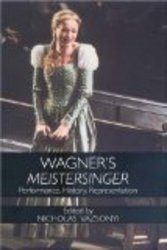Description
The book "Wagner's Meistersinger: Performance, History, Representation" explores the significance and impact of Richard Wagner's opera, Die Meistersinger von Nurnberg. The opera, which premiered in 1868, quickly became one of the most performed operas and was even adopted as Germany's national opera. Its themes of Germanness and anti-Semitism made it a popular choice for the Third Reich, and it was the first opera performed at the Bayreuth festival after World War II. The book is divided into three sections, with the first focusing on the performance of the opera and featuring contributions from experienced artists. The second section delves into the representation of German history in the opera and its political appropriation. The final section explores various perspectives on the opera, including its genre, gender issues, and Wagner's own thoughts on the work. Overall, the book provides a comprehensive analysis of the opera and its significance in history.
Richard Wagner's Die Meistersinger von Nurnberg has been one of the most performed operas ever since its premier in 1868. It was adopted as Germany's national operas ('Nationaloper'), not least because of its historical coincidence with the unification of Germany under Bismarck in 1871. The opera epitomizes themes of Germanness, including what many regard as blatant anti-Semitic imagery, and thus ideally suited the agenda of the Third Reich, or so it seemed. Despite or perhaps because of the ease with which the Nazis appropriated the work, it was selected as the first opera to be performed when the Bayreuth festival re-opened after the War.The first section of this volume, 'Performing Meistersinger, contains three commissioned articles from internationally respected artists - a conductor (Peter Schneider), a stage director (Harry Kupfer) and a singer (Dietrich Fischer-Dieskau), all experienced in the performance of this unusually demanding 5-hour work. The second section, 'Meistersinger and History', examines both the representation of German history in the opera and the way the opera has functioned in history through political appropriation and staging practice. The third section, 'Representations', is the most eclectic, exploring in the first place the problematic question of genre from the perspective of a theatrical historian. The chronic issue of Wagner's chief opponent, Eduard Hanslick, and his musical and dramatic representation in the opera as Bessmesser, is then addressed, as are gender issues, and Wagner's own utterances concerning the opera.Contributors: NICHOLAS VAZSONYI, PETER SCHNEIDER, HARRY KUPFER, DIETRICH FISCHER-DIESKAU, HANS RUDOLF VAGET, LUTZ KOEPNICK, DAVID B. DENNIS, DAVID J. LEVIN, KLAUS VAN DEN BERG, THOMAS S. GREY, EVA RIEGER, PETER HOYNG Nicholas Vazsonyi is Assistant Professor of German, University of South Carolina
